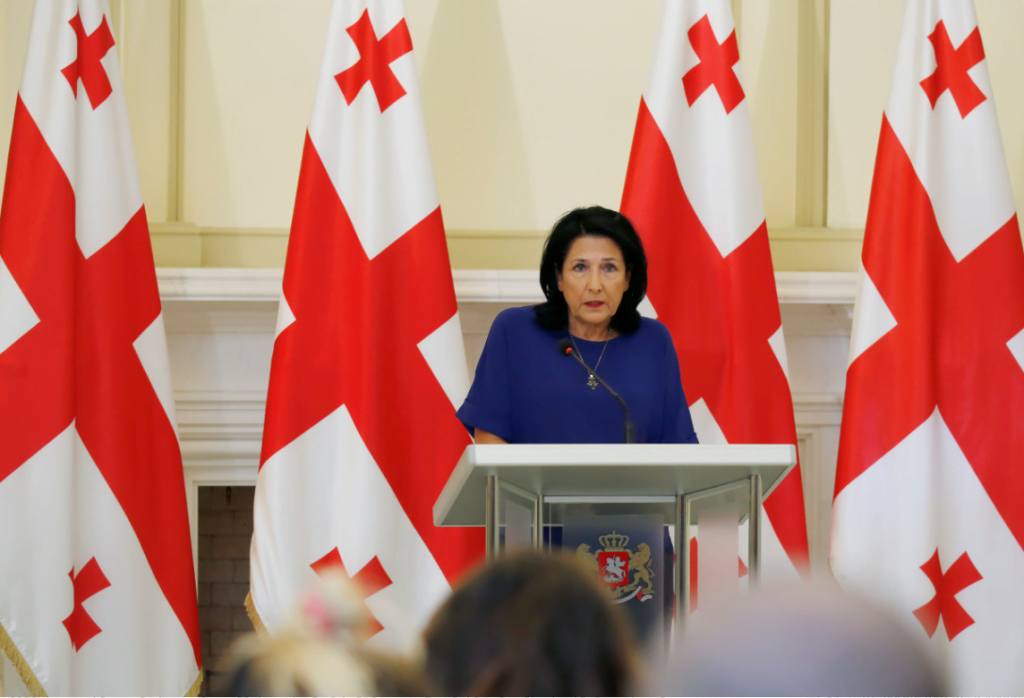On November 26, Georgian President Salome Zurabishvili signed a decree on approving the new rule of inmate pardoning developed through the consultations with the Georgian Parliament and the Justice Ministry.
The new rule of pardoning provides new criteria and procedures for considering inmate cases and differs from the regulations approved by ex-President Giorgi Margvelashvili, which was in force from March 27, 2014 to November 26, 2019.
Responding to criticism, President Zurabishvili self-imposed “moratorium” on pardons on September 18. Later on September 20, the Prosecutor’s Office launched investigation into alleged abuse of power over the August presidential pardon of convicts.
Principles of pardoning
Unlike the previous regulations, the presidential decree issued on November 26 clearly outlines the principles of pardoning.
According to the decree, “presidential power to pardoning is based on the principle of humanism, as well as state interests.” It also noted that pardoning that is President’s exclusive right “as a rule, is used as an exception.”
Following the approval of the new rule, the presidential administration explained that the new rule “will significantly reduce the number of pardons,” because presidential power will be used only “in special and particular individual cases.”
Unlike the old regulations, the new rule defines that before pardoning a convict, the President, along with the state of inmate’s health and family, will also take into consideration the motive of a crime and the harm it caused. The President will also pay attention whether the committed crime posed a serious threat to the public, whether the crime was committed against a family member or a child, whether a crime was committed against a law enforcer.
Pardoning criteria
Unlike ex-President Margvelashvili’s regulations, the new rule tightens punishment for grave and especially grave offences.
For instance, under the new rule, those inmates, who have been sentenced to life imprisonment can apply to the President for pardoning only after serving 20 years of their sentences, instead of previous 15 years. Moreover, those inmates who have been convicted for grave and especially grave offences and sentenced to over five years of imprisonment, will have the right to apply for pardoning only after serving two thirds of their sentences, instead of previous one half.
President Zurabishvili also removed those privileges from the rule, which were introduced by ex-President Margvelashvili in February 2018 for inmates convicted for non-violent crimes. According to these privileges, inmates convicted for non-violent crimes no longer had to serve a part of their sentences to obtain the right for presidential pardon. It mainly applied to drug users, as well as inmates convicted for crimes against property, economic and financial crimes.
Along with tightening criteria towards inmates convicted for grave and especially grave crimes, President Zurabishvili softened the attitude towards inmates convicted for less grave crimes. In particular, if under the previous rule, they could apply for pardoning after serving one third of their sentences, according to the new rule, this term was reduced to one fourth.
Pardoning procedure
Like in case of President Margvelashvili, Salome Zurabishvili reserves the right to pardon inmates bypassing her own regulations. But if Margvelashvili was entrusting the Pardon Commission composed of the Public Defender and civil society representatives to consider the inmates’ applications and was making decisions based on the commission’s recommendations, President Zurabishvili considers all applications herself and until making final decisions, if needed, she holds consultations with relevant state agencies or experts from the field.
Upon Zurabishvili’s decision, a special electronic program on pardoning procedures will be introduced at the President’s administration before January 1, 2021, which will contain “full information about inmates seeking pardoning, as well as final decisions on pardoning.”
This post is also available in: ქართული (Georgian) Русский (Russian)

